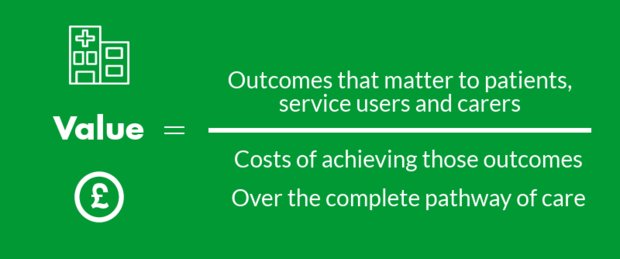25 January 2018
Professor John Moxham blogs about the importance of focusing on value and argues that the only way to deliver sustainable, high quality, healthcare is to increase value – better outcomes for the same cost or the same outcomes at a reduced cost.
Value based healthcare is a core theme of the King’s Health Partners Academic Health Sciences Centre. In this blog, Professor John Moxham, Director of Clinical Strategy at King’s Health Partners, sets out the importance of focusing on value, by measuring outcomes that matter to patients across complete pathways of care and the associated costs of producing the outcomes. He argues that the only way to deliver sustainable, high quality, healthcare is to increase value – better outcomes for the same cost or the same outcomes at a reduced cost.
Why Value?
Health and social care is under intense pressure. There are:
- Unprecedented levels of demand for services, in large part due to significantly increased numbers of people developing long-term conditions, both physical and mental
- Severe financial constraints, and
- Major health inequalities in our communities - poor health disproportionately affects the socio-economically disadvantaged.
These challenges are likely to intensify. We have an urgent need to increase value, thereby improving outcomes for our patients and creating a strong health and care system that is affordable.
In healthcare the word “outcomes” is often used in a loose way. In the context of value based healthcare outcomes are changes in the health of a patient, and improving outcomes is the core purpose of healthcare interventions.
This contrasts with many performance indicators that focus on processes. Of course good processes may contribute to good outcomes but making process measures can seldom be a substitute for measuring true outcomes. Rapid access to poor quality care or overtreatment, or not seeking to address what matters most to the patient do not improve outcomes or value.
↓Scroll down to watch Professor Moxham's short clip introducing our Value Based Healthcare mini-series↓
At King’s Health Partners we define ‘value’ as:
Crucial to this approach is understanding healthcare from the patients’ perspective. For example, patients who have a stroke certainly want to survive, but the level of function achieved is also critically important to them. They would like to get better quickly, and they want to avoid complications, for example hospital acquired infections. Patients also want a sustained recovery, free of recurrence and not marred by long-term adverse consequences of therapy. Capturing comprehensive patient and carer-reported outcomes allows health and care providers, across complete pathways of care, to reorientate treatment to put the outcomes that matter to patients and their carers at the centre of all endeavours.
The purpose of healthcare is to deliver the best possible care to all patients within the resources available. Value based healthcare achieves this and therefore resonates strongly with patients and carers. It prioritises their experience and improved health. Staff also identify with best value care because it supports them to deliver the best possible care to their patients. Staff are empowered to feel they are able to do their best for patients and this is a strong motivation that provides considerable satisfaction. Finally, optimising value ensures that commissioners of care are getting the best possible value – the best results for the money available.
Watch Professor Moxham's short clip introducing our Value Based Healthcare mini-series: Prescribing Value
https://
Value at Kings Health Partners
Across our organisations, we have been developing capabilities and an understanding of how to drive better value:
- Our three partner trusts are all undertaking major internal quality improvement programmes
- Clinical Academic Groups have been publishing Outcomes Books which report healthcare outcomes in their respective clinical areas. We believe that being open and transparent about the care and outcomes we deliver results in a culture of improvement across our partnership. In particular it is vital that our staff receive feedback on the outcomes that they have achieved for their patients
- Our Institutes and Networks Programme is focusing on how to make best use of our collective clinical academic assets in several specialties across multiple clinical pathways across wide geographical networks
- Our Mind & Body programme is working across all the healthcare services we provide to ensure that the mental, physical and psychosocial needs of patients are taken into account
- Information on outcomes and costs are vital enablers of optimising health economics so we can share data in an appropriate way which will improve patient experience and outcomes
- Informatics is one of our most important assets and we have unique strengths in using it to improve coordination of patient care and to enhance clinical decision making through research and planning, which will in turn improve the efficiency of our health system
- Pilot Pathway-Mapping Projects, we have started two projects, in orthopaedics and cardiovascular care, and are exploring our next potential pathways in areas that link with local priorities. These pilot projects will help us develop our capability to implement a value-based approach in healthcare we provide:
- Cardiovascular care – focusing on the prevention and early diagnosis of patients with Heart Failure
- Orthopaedic care – examining the hip replacement pathway to reduce variation and measure the value of different orthopaedic interventions
- Mental health of older adults – specifically focusing on depression, we’re looking at redesigning the pathway to improve access for the most vulnerable
- Renal care – exploring the complete renal dysfunction pathway to identify opportunities to increase value.
Last year, we published our Value Based Healthcare Strategy that talks about our ambitions. The next step is for us to develop a value based healthcare methodology and toolkit that we can use to support King’s Health Partners, and also our primary care and community care colleagues in Lambeth and Southwark, partners across south east London, and beyond, to increase value in all the services we contribute to.
Looking to the Future
We believe there is an urgent need to focus our efforts on increasing value. This will improve outcomes for all patients by ensuring that quality of, and access to, care is not affected by deprivation, background or mental health. A value-based approach will also make better use of every pound available and build a system that is more sustainable.
Building our value toolkit will require us to draw on talent and expertise from across King’s Health Partners and beyond. We will be looking to work with partners locally and we will learn from pathways that have already shown excellence in delivering increased value. These include work related to Chronic Obstructive Pulmonary Disease which led to increased referrals for the condition and optimisation of drug therapies, and work on the Catheter Care pathway, which led to a demonstrable decrease in catheter associated infections in our hospitals.
Read more about Value Based Healthcare at King's Health Partners.





